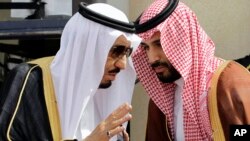Saudi Arabia has unveiled a long-term plan that could result in its most significant economic change in decades by proposing a shift away from oil, the country's most valuable asset.
The economic reform plan is part of an effort to revive Saudi Arabia's economy, which has been hard hit by sharp drops in crude oil prices, forcing the world's largest exporter of crude to find new sources of income.
The reforms are intended to eliminate housing and unemployment issues and ensure the most needy citizens get water and energy subsidies.
The plan will focus on privatizations, subsidy cuts, the sale of five percent of oil giant Saudi Aramco and the creation of a $2 trillion fund to develop cities.
The plan, named "Saudi Vision 2030," was approved Monday by the Saudi Cabinet.
"I think by 2020, if oil stops, we can survive," said Prince Mohammed bin Salman in a nationally televised interview.
Implementation of the plan may not come without challenges. In a country where 70 percent of revenues come from oil, the Saudi government has for decades spent enormous amounts of money on its citizens without requiring them to pay taxes.
Saudi Arabia's plans follow other long-term economic reform plans announced by neighboring Persian Gulf countries, Kuwait, Qatar and the United Arab Emirates.





